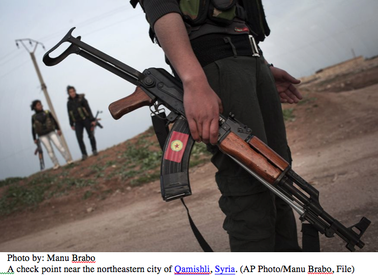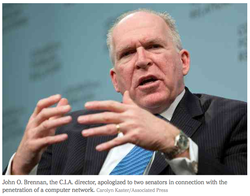
(to read the article on Washington Post website, click here)
By Emily Wax-Thibodeaux September 27
The new supervisor thought his idea was innocent enough. He wanted the baristas to write the names of customers on their cups to speed up lines and ease confusion, just like other Starbucks do around the world.
But these aren’t just any customers. They are regulars at the CIA Starbucks.
“They could use the alias ‘Polly-O string cheese’ for all I care,” said a food services supervisor at the Central Intelligence Agency, asking that his identity remain unpublished for security reasons. “But giving any name at all was making people — you know, the undercover agents — feel very uncomfortable. It just didn’t work for this location.”
This purveyor of skinny lattes and double cappuccinos is deep inside the agency’s forested Langley, Va., compound.
Welcome to the “Stealthy Starbucks,” as a few officers affectionately call it.
Or “Store Number 1,” as the receipts cryptically say.
The baristas go through rigorous interviews and background checks and need to be escorted by agency “minders” to leave their work area. There are no frequent-customer award cards, because officials fear the data stored on the cards could be mined by marketers and fall into the wrong hands, outing secret agents.
It is one of the busiest Starbucks in the country, with a captive caffeine-craving audience of thousands of analysts and agents, economists and engineers, geographers and cartographers working on gathering intelligence and launching covert operations inside some of the most vexing and violent places around the world.
“Obviously,” one officer said, “we are caffeine-addicted personality types. ”
Because the campus is a highly secured island, few people leave for coffee, and the lines, both in the morning and mid-afternoon, can stretch down the hallway. According to agency lore, one senior official, annoyed by the amount of time employees were wasting, was known to approach someone at the back of the line and whisper, “What have you done for your country today?”
This coffee shop looks pretty much like any other Starbucks, with blond wooden chairs and tables, blueberry and raspberry scones lining the bakery cases, and progressive folk rock floating from the speakers. (There are plans to redecorate, possibly including spy paraphernalia from over the decades.)
But the manager said this shop “has a special mission,” to help humanize the environment for employees, who work under high pressure often in windowless offices and can’t fiddle with their smartphones during downtime. For security, they have to leave them in their cars.
Amid pretty posters for Kenyan beans and pumpkin spice latte, nestled in the corner where leather armchairs form a cozy nook, the supervisor said he often hears customers practicing foreign languages, such as German or Arabic.
The shop is also the site of many job interviews for agents looking to move within the CIA, such as from a counterterrorism post to a nuclear non-proliferation gig. “Coffee goes well with those conversations,” one officer said.
The chief of the team that helped find Osama Bin Laden, for instance, recruited a key deputy for the effort at the Starbucks, said another officer who could not be named.
One female agent said she occasionally runs into old high school and college friends in line at Starbucks. Until then, they didn’t know they worked together. Such surprise reunions are not uncommon. Working at the agency is not something you e-mail or write Facebook posts about, she said.
Normally, during the day, the bestsellers are the vanilla latte and the lemon poundcake. But for officers working into the night, whether because of a crisis or they are dealing with someone in a different time zone, double espressos and sugary Frappuccinos are especially popular.
“Coffee culture is just huge in the military, and many in the CIA come from that culture ,” said Vince Houghton, an intelligence expert and curator at the International Spy Museum. “Urban myth says the CIA Starbucks is the busiest in the world, and to me that makes perfect sense. This is a population who have to be alert and spend hours poring through documents. If they miss a word, people can die.”
The nine baristas who work here are frequently briefed about security risks.
“We say if someone is really interested in where they work and asks too many questions, then they need to tell us,” the supervisor said.
A female barista who commutes from the District before sunrise said she initially applied to work for a catering company that services federal buildings in the region, not knowing where she might be assigned. She said she underwent extensive vetting “that was more than just a credit check.”
The 27-year-old woman was offered a job and told that she would be working in food services in Langley. On her first morning of work, she recalled, she put a location in her GPS and nothing came up. So she called the person who had hired her and got an explanation of the address. “Before I knew it, I realized I was now working for the Starbucks at the CIA,” she said.
Unfortunately, she can’t boast about where she works at parties. “The most I can say to friends is that I work in a federal building,” she said.
She said she has come to recognize people’s faces and their drinks. “There’s caramel-macchiato guy” and “the iced white mocha woman,” she said.
“But I have no idea what they do,” she added, fastening her green Starbucks apron and adjusting her matching cap. “I just know they need coffee, a lot of it.”



 RSS Feed
RSS Feed
